 |
 |
Our enthusiastic and extremely knowledgeable perennials team is here to answer your questions and help you choose the best perennials for your situation. There’s always something in bloom for sun, shade, butterflies, birds or deer resistance as well as a variety of bulbs for your space.
Stroll through our time-tested favorites and introduce yourself to the newest varieties. We garden with perennials too; we love them and it shows!
|
58 found, showing page 4 of 4
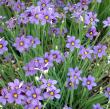
Violet blooms. Grass-like foliage. Self-seeding native. Clumping. USDA 4-8
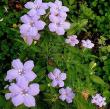
Small, lavender flowers. Dense, mounded foliage. USDA 4-8
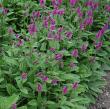
Rose-lavender blooms. Dense glossy foliage. Clumping Habit. USDA 4-8
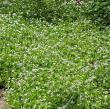
White blooms. Fragrant lance-shaped dark green leaves. Edible foliage. Tolerates deep shade. USDA 4-8
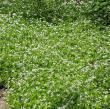
White blooms. Fragrant lance-shaped dark green leaves. Edible foliage. Tolerates deep shade. USDA 4-8
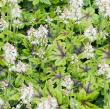
Plant Height: 10 inches
Flower Height: 15 inches
Spacing: 12 inches
Sunlight: partial shade full shade
Hardiness Zone: 4a
Description:
Large, deeply lobed green leaves with burgundy spines in the center form a neat mound of foliage; pink flower buds open to reveal the foamy white flowers on graceful spikes that persist for weeks; shade tolerant and excellent for under canopy groundcover
Ornamental Features:
Elizabeth Oliver Foamflower has masses of beautiful spikes of lightly-scented white bell-shaped flowers rising above the foliage from mid spring to mid summer, which emerge from distinctive shell pink flower buds, and which are most effective when planted in groupings. The flowers are excellent for cutting. Its attractive glossy lobed leaves remain emerald green in color with pointy burgundy spines throughout the year.
Landscape Attributes:
Elizabeth Oliver Foamflower is an herbaceous evergreen perennial with tall flower stalks held atop a low mound of foliage. Its medium texture blends into the garden, but can always be balanced by a couple of finer or coarser plants for an effective composition.
This is a relatively low maintenance plant, and is best cleaned up in early spring before it resumes active growth for the season. Deer don't particularly care for this plant and will usually leave it alone in favor of tastier treats. It has no significant negative characteristics.
Elizabeth Oliver Foamflower is recommended for the following landscape applications:
- Mass Planting
- Rock/Alpine Gardens
- Border Edging
- General Garden Use
- Groundcover
- Container Planting
Planting & Growing:
Elizabeth Oliver Foamflower will grow to be about 10 inches tall at maturity extending to 15 inches tall with the flowers, with a spread of 14 inches. When grown in masses or used as a bedding plant, individual plants should be spaced approximately 12 inches apart. Its foliage tends to remain low and dense right to the ground. It grows at a medium rate, and under ideal conditions can be expected to live for approximately 10 years. As an evegreen perennial, this plant will typically keep its form and foliage year-round.
This plant does best in partial shade to shade. It requires an evenly moist well-drained soil for optimal growth. It is particular about its soil conditions, with a strong preference for rich, acidic soils. It is somewhat tolerant of urban pollution, and will benefit from being planted in a relatively sheltered location. Consider covering it with a thick layer of mulch in winter to protect it in exposed locations or colder microclimates. This particular variety is an interspecific hybrid. It can be propagated by division; however, as a cultivated variety, be aware that it may be subject to certain restrictions or prohibitions on propagation.
Elizabeth Oliver Foamflower is a fine choice for the garden, but it is also a good selection for planting in outdoor pots and containers. It is often used as a 'filler' in the 'spiller-thriller-filler' container combination, providing a mass of flowers and foliage against which the larger thriller plants stand out. Note that when growing plants in outdoor containers and baskets, they may require more frequent waterings than they would in the yard or garden.
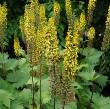
Huge lemon-yellow flower spikes. Deep purple stems. Large green, toothed foliage. USDA 4-8
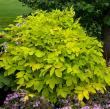
Golden foliage with white blooms and purple berries in fall. Naturalizing. USDA 4-8
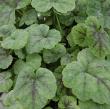
White blooms. Red speckled foliage. Groundcover. Native. USDA 4-8
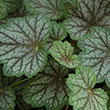
Vibrant, blue-green foliage has deep, purple veins. White flowers. USDA 4-8
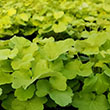
Plant Height: 6 inches
Flower Height: 12 inches
Spacing: 12 inches
Sunlight: full sun, partial shade, full shade
Hardiness Zone: 4a
Other Names: Coralbells, Alumroot
Description:
Dainty spikes of cream colored bells rise from a compact mound of bright lemon foliage with silvery undersides; foliage is more chartreuse in denser shade; amazing contrast to other plants; great versatility; keep soil moist in the heat of summer
Ornamental Features:
Citronelle Coral Bells features dainty spikes of creamy white bell-shaped flowers rising above the foliage from late spring to mid summer. Its attractive crinkled lobed leaves remain lemon yellow in color with curious silver undersides throughout the year.
Landscape Attributes:
Citronelle Coral Bells is a dense herbaceous evergreen perennial with tall flower stalks held atop a low mound of foliage. Its relatively fine texture sets it apart from other garden plants with less refined foliage.
This is a relatively low maintenance plant, and should be cut back in late fall in preparation for winter. It is a good choice for attracting hummingbirds to your yard. It has no significant negative characteristics.
Citronelle Coral Bells is recommended for the following landscape applications:
- Mass Planting
- Rock/Alpine Gardens
- Border Edging
- General Garden Use
- Groundcover
- Container Planting
- Planting & Growing
Citronelle Coral Bells will grow to be only 6 inches tall at maturity extending to 12 inches tall with the flowers, with a spread of 15 inches. When grown in masses or used as a bedding plant, individual plants should be spaced approximately 12 inches apart. Its foliage tends to remain low and dense right to the ground. It grows at a medium rate, and under ideal conditions can be expected to live for approximately 10 years. As an evegreen perennial, this plant will typically keep its form and foliage year-round.
This plant performs well in both full sun and full shade. However, you may want to keep it away from hot, dry locations that receive direct afternoon sun or which get reflected sunlight, such as against the south side of a white wall. It prefers to grow in average to moist conditions, and shouldn't be allowed to dry out. It is not particular as to soil type or pH. It is somewhat tolerant of urban pollution. Consider covering it with a thick layer of mulch in winter to protect it in exposed locations or colder microclimates. This particular variety is an interspecific hybrid. It can be propagated by division; however, as a cultivated variety, be aware that it may be subject to certain restrictions or prohibitions on propagation.
Citronelle Coral Bells is a fine choice for the garden, but it is also a good selection for planting in outdoor pots and containers. It is often used as a 'filler' in the 'spiller-thriller-filler' container combination, providing a mass of flowers and foliage against which the larger thriller plants stand out. Note that when growing plants in outdoor containers and baskets, they may require more frequent waterings than they would in the yard or garden.
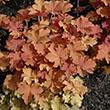
Plant Height: 10 inches
Flower Height: 18 inches
Spacing: 15 inches
Sunlight: full sun, partial shade, full shade
Hardiness Zone: 4a
Other Names: Coralbells, Alumroot
Description:
Dainty spikes of cream colored bells rise from a compact mound of peachy-gold foliage with reddish undersides, emerging red in the spring; amazing contrast to other plants; great versatility; keep soil moist in the heat of summer
Ornamental Features:
Caramel Coral Bells features dainty spikes of creamy white bell-shaped flowers rising above the foliage from late spring to mid summer. Its attractive tomentose lobed leaves emerge red in spring, turning peach in color with curious red undersides the rest of the year.
Landscape Attributes:
Caramel Coral Bells is a dense herbaceous evergreen perennial with tall flower stalks held atop a low mound of foliage. Its relatively fine texture sets it apart from other garden plants with less refined foliage.
This is a relatively low maintenance plant, and should be cut back in late fall in preparation for winter. It is a good choice for attracting hummingbirds to your yard. It has no significant negative characteristics.
Caramel Coral Bells is recommended for the following landscape applications:
- Mass Planting
- Rock/Alpine Gardens
- Border Edging
- General Garden Use
- Groundcover
- Container Planting
- Planting & Growing
Caramel Coral Bells will grow to be about 10 inches tall at maturity extending to 18 inches tall with the flowers, with a spread of 18 inches. When grown in masses or used as a bedding plant, individual plants should be spaced approximately 15 inches apart. Its foliage tends to remain low and dense right to the ground. It grows at a medium rate, and under ideal conditions can be expected to live for approximately 10 years. As an evegreen perennial, this plant will typically keep its form and foliage year-round.
This plant performs well in both full sun and full shade. However, you may want to keep it away from hot, dry locations that receive direct afternoon sun or which get reflected sunlight, such as against the south side of a white wall. It prefers to grow in average to moist conditions, and shouldn't be allowed to dry out. It is not particular as to soil type or pH. It is somewhat tolerant of urban pollution. Consider covering it with a thick layer of mulch in winter to protect it in exposed locations or colder microclimates. This particular variety is an interspecific hybrid. It can be propagated by division; however, as a cultivated variety, be aware that it may be subject to certain restrictions or prohibitions on propagation.
Caramel Coral Bells is a fine choice for the garden, but it is also a good selection for planting in outdoor pots and containers. It is often used as a 'filler' in the 'spiller-thriller-filler' container combination, providing a mass of flowers and foliage against which the larger thriller plants stand out. Note that when growing plants in outdoor containers and baskets, they may require more frequent waterings than they would in the yard or garden.
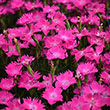
Fragrant rose-pink blooms. Long blooming. Upright clumping. USDA 4-8
58 found, showing page 4 of 4




